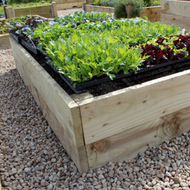Getting Started - Top Tips for new growers.
In answer to a number of queries on how to get started as a new vegetable gardener here's a few of my top tips to get you going:
What do you like eating? This might sound like a silly question but you'd be surprised the amount of people who grow mountains of courgettes because they're easy to grow but don't actually like eating them! Apart from being a wonderful hobby the big pay off for home vegetable growers is happily munching your way through homegrown crops and experiencing the flavour and satisfaction of the fact you did it yourself.
Start Small Vegetable gardening really isn't difficult but it does require some work keeping your plants healthy and weed free. Don't plant more than you can easily look after as you don't want the pleasure of growing to turn into a chore.I would strongly recommend growing in containers or raised beds for the first year to see how you get on as they will be much easier to take care of. A 6ft by 3ft raised bed will give you a surprising amount of crop but you can also use a variety of smaller planters for specific plants like carrots, potatoes, tomatoes and salad. I include some links to examples of easy to use containers and beds to get you going:
Pea and bean planter Carrot Patio Planter Tomato Patio Planter 3 Tier Plant rack Reuseable Growbag

Keep it simple - Grow easy crops Don't go immediately for exotic crops as many of them will require special attention to flourish. Many warmer climate varieties need considerable nursing to grow in our cool Summers so grow plants which are as forgiving as possible. I would also steer clear of most of the Brassica family (cabbage, cauliflower, broccoli, sprouts) for the first year as they take up a lot of room (you'll need a bigger plot to look after) and they can be a little tricky.
I would recommend any beginner to grow salads as they're quick and easy and will give you a feel for how plants grow but if you'd like to be more adventurous here's our list of recommended plants for first time gardeners:
Broad Beans - Aquadulce Claudia Runner Bean - Enorma Beetroot - Pablo Carrot - Early Nantes Chard - Swiss Chard Chives - Fine Leaved Courgette - Defender F1 Kale - Red Russian Lettuce - Little Gem, Batavia Red & Green Mix, Crisphead Saladin. Oriental salad - Mizuna, Mustard Red Frills, Rocket Napoli. Parsley - Italian Giant Pea - Sugar Snap Delikett Radish - Short Top Forcing Spring Onion - Ishikura Bunching Spinach - Perpetual Spinach Squash - Uchiki Kuri Turnip - Purple Top Milan Onion - Santero Potato - Homeguard, Orla, Setanta.
Make sure you have enough light - Location location location. Most vegetables will need at least 6 hours of sunshine per day to produce a good crop so the location of your garden is important. A south facing garden is ideal but if you have a more shaded spot there will still be plants you can grow but you will be more limited to shade tolerant varieties.

Start plants off in modules or buy seedling plants You'll have a much better chance of success. Direct sowing can be tricky with the emerging seedling being susceptible to attack from slugs or other pests. Growing in modules means starting the seed off in a gentle environment in a small compost module or plug. You can link to our article on growing in modular trays here.
Seedling plug plants are baby vegetable plants ready to plant out and get going. We supply a wide range of 4 week old plants to get you past some of the tricky stuff and directly on to the home straight.
Soil - compost Don't forget vegetables require a higher nutrient level than flowering plants so you need to make sure your soil well nourished enough to support your plants. In small planters a good multipurpose compost is fine provided you add the right plant feed for your plants but for larger raised beds we recommend a soil/compost mix.
For a handy top quality plant feed for adding to multi purpose compost you won't find better than 'Seamungus' free range chicken manure and seaweed feed. It's a pelleted product which contains nitrogen from the chicken manure as well as a broad range of nutrients from the seaweed. It's an essential part of the beginners toolkit.
Spacing Spacing is one of the most common mistakes the beginner will make with plants often spaced too close together, cramped plants will not thrive and will produce weak and stunted specimens. This really is important and can sometimes be hard for a beginner. For example a cabbage plant will need 50cm between plants and another 50cm between rows. This can be difficult to imagine when you're holding a tiny seed in your hand but this adds up to metre diameter circle around each plant, bet you never thought it's be that much!
You will see the correct spacing when you click on any of our seeds in the seed shop.
You can also follow us on our youtube channel as expert organic gardener Klaus Laitenberger and myself take you from seed to finished plant with a broad variety of vegetables.
